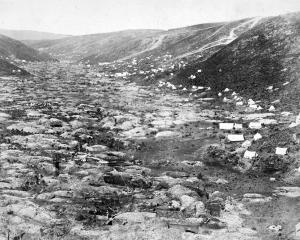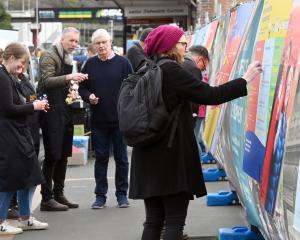

I remember some of our family’s experiences of living in France: the widespread practice of foraging, the local food markets and the leisurely meals. I remember the extensive rail network, the barter economy and the state support for basic needs. Not that all is perfect, but the social contract is strong and there is ready access to healthcare, public transport and healthy housing, alongside great cheese. Despite France’s reputation for protest, Macron’s leadership on climate and the economics of enough comes from a strong public mandate.
Here in Otepoti Dunedin we have our own leadership choices to make with local body elections now under way. Local government works for the needs of people in our communities now and for future generations. More than ever we need leadership that understands the urgency of the climate challenge. We need leadership that is able to plan, prepare and act not only for the present but for our children and grandchildren as well.
We can’t know exactly what the future will hold, but the global scientific consensus is that unless we decarbonise dramatically and urgently, we are in for a very rough ride. At a regional level we can already see the impact of unsustainable practices in the pollution of our waterways. The impact of rising greenhouse gas emissions is also being experienced in floods, rising snow lines, drought and fires. At a city level, while the city council has a target to reduce Otepoti Dunedin’s greenhouse gas emissions to net zero by 2030, much of our housing is old, cold and leaky. We have a car-centric transport system, homes and industry burn coal for heat, and we have to contend with rising sea-levels putting thousands of low lying and vulnerable households at risk. That’s a lot to turn around and we don’t have much time.
Fortunately, some of these things are changing. The central city upgrade is not only enabling critical infrastructure replacement. It is also providing for a friendlier more vibrant central city. A reduction in car traffic will provide for pedestrians and those who want to slow down or use alternative, lower-cost transport. Then there’s the South Dunedin Future Programme, a partnership approach between the city and regional councils and involving GNS Science. It involves rich community engagement, environmental monitoring, and infrastructure improvements.
The 2015 floods affecting South Dunedin had an estimated cost of $138 million. Around 1200 homes and businesses were damaged as water entered properties. As extreme rainfall events become more frequent and as our coastlines change, more flood events are guaranteed while insurance retreat is already under way. And for this reason alone South Dunedin presents the most serious litmus test of leadership and the credibility of mayoral candidates.
We have limited resources to invest in adaptation and a rapidly closing window in which to act. Will we take a rational planned approach to risk mitigation, working alongside community and with the best modelling to avoid poor decisions, to ensure adaptation actions are managed in an equitable way? Or will we vote to go against expert advice?
The first National Adaptation Plan states that ‘‘Councils have statutory responsibilities to avoid or mitigate natural hazards and to have regard to the effects of climate change when making certain decisions’’. Failure to anticipate and recognise the urgency of the climate challenge is not simply a failure of imagination. It’s a failure of leadership that we can ill afford.
My hope is that this year, collectively, we will secure a mandate through our local body elections to increase the momentum on local climate action. What happens in South Dunedin is nationally significant and depends not only on residents but also on effective city leadership.
*Scott Willis is a climate and energy consultant. Each week in this column one of a panel of writers addresses issues of sustainability.












